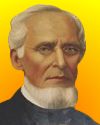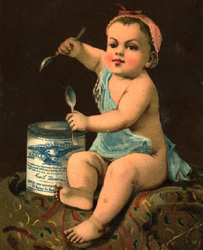 (source)
(source)
|
Gail Borden
(9 Nov 1801 - 11 Jan 1874)
American manufacturer, inventor and food scientist who invented a commercial method of condensing milk to preserve it.
|
Gail Borden and his Inventions
Resources on this site
See also:
- Science Quotes by Gail Borden.
- 9 Nov - short biography, births, deaths and events on date of Borden's birth.
- Awards were presented for Borden's “Meat Biscuit” at exhibitions both home and abroad. At the London Great Exhibition, first class medals recognized Borden's invention, in the company of other American winners such as McCormick's “Virginia Reaper,” and Goodyear's “India Rubber Fabrics.”
- Borden's Meat Biscuit - his first invention - preserved meat extracts. It drew much praise in several articles in the Scientific American periodical.
- Condensed Milk - Borden's invention drew competitors, as shown in this Manufacturer and Builder article (May 1878).
- Borden's Condensed Milk - was his great invention that launched his very successful diary company supplying his Eagle brand milk to cities distant from farm supply. It was also the subject of several Scientific American articles.
- Gail Borden - A biography published in 1866 from A History of American Manufactures from 1608 to 1860.
- Military Use of Borden's Meat Biscuit was recognized as highly suitable for meal rations, and was favorably compared in the Scientific American periodical against the difficulties experienced by other countries having to preserve meats for their military needs.
- Gail Borden's First Invention was patented under the title “Preparation of Portable Soup-Bread”, issued as U.S. Patent No. 7,066, on 5 Feb 1850.
- Gail Borden's Condensed Milk Patent gives Borden's description of his method in U.S. Patent No. 15,553 issued 19 Aug 1856 - the first effective commercial process in the U.S. for condensing and preserving milk.
- Gail Borden's Fruit Juice Concentrating Patent shows his continuing interest in preserving more types of food detailed in U.S. Patent 35,919, issued 22 July 1862, titled “Improvement in Concentrating and Preserving For Use Cider and Other Juices of Fruits.”
- Gail Borden: Dairyman to a Nation, by Joe Bertram Frantz. - book suggestion.
- Booklist for Gail Borden.





